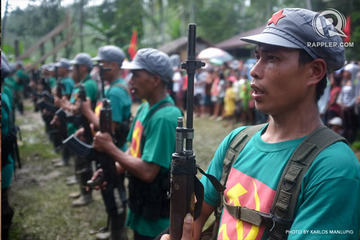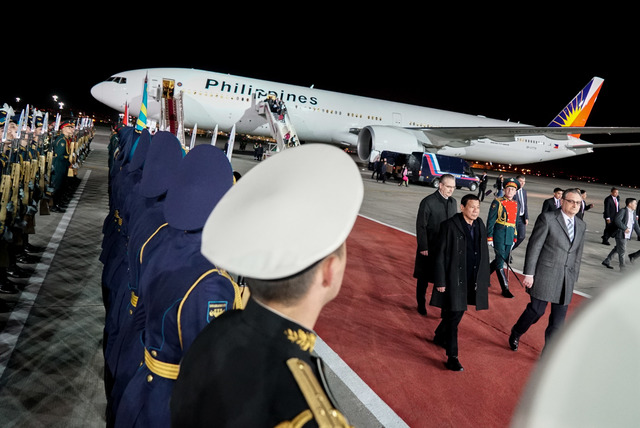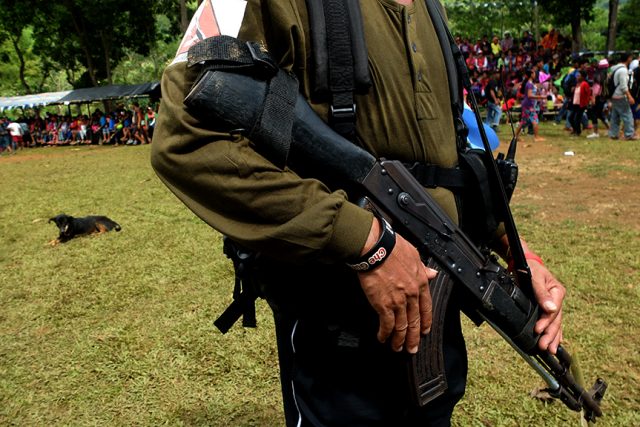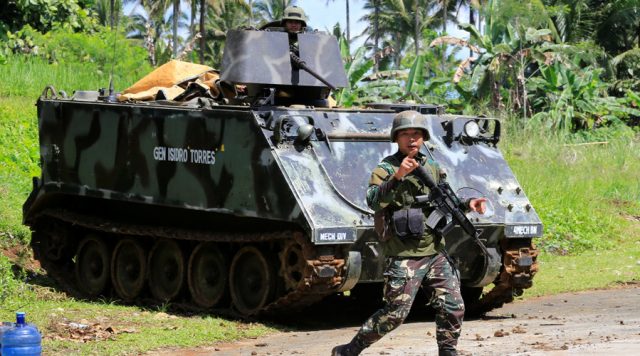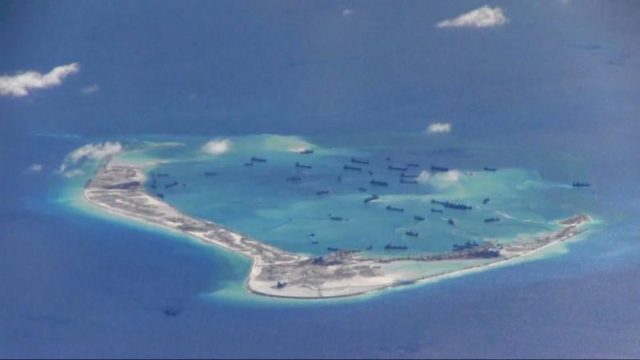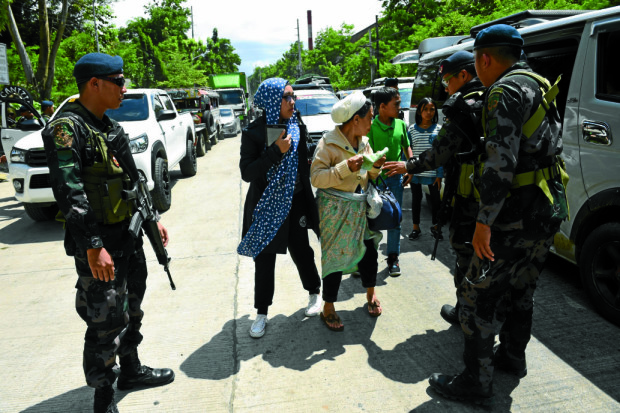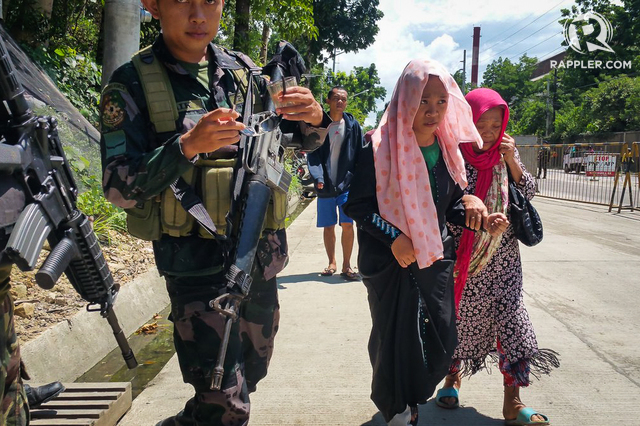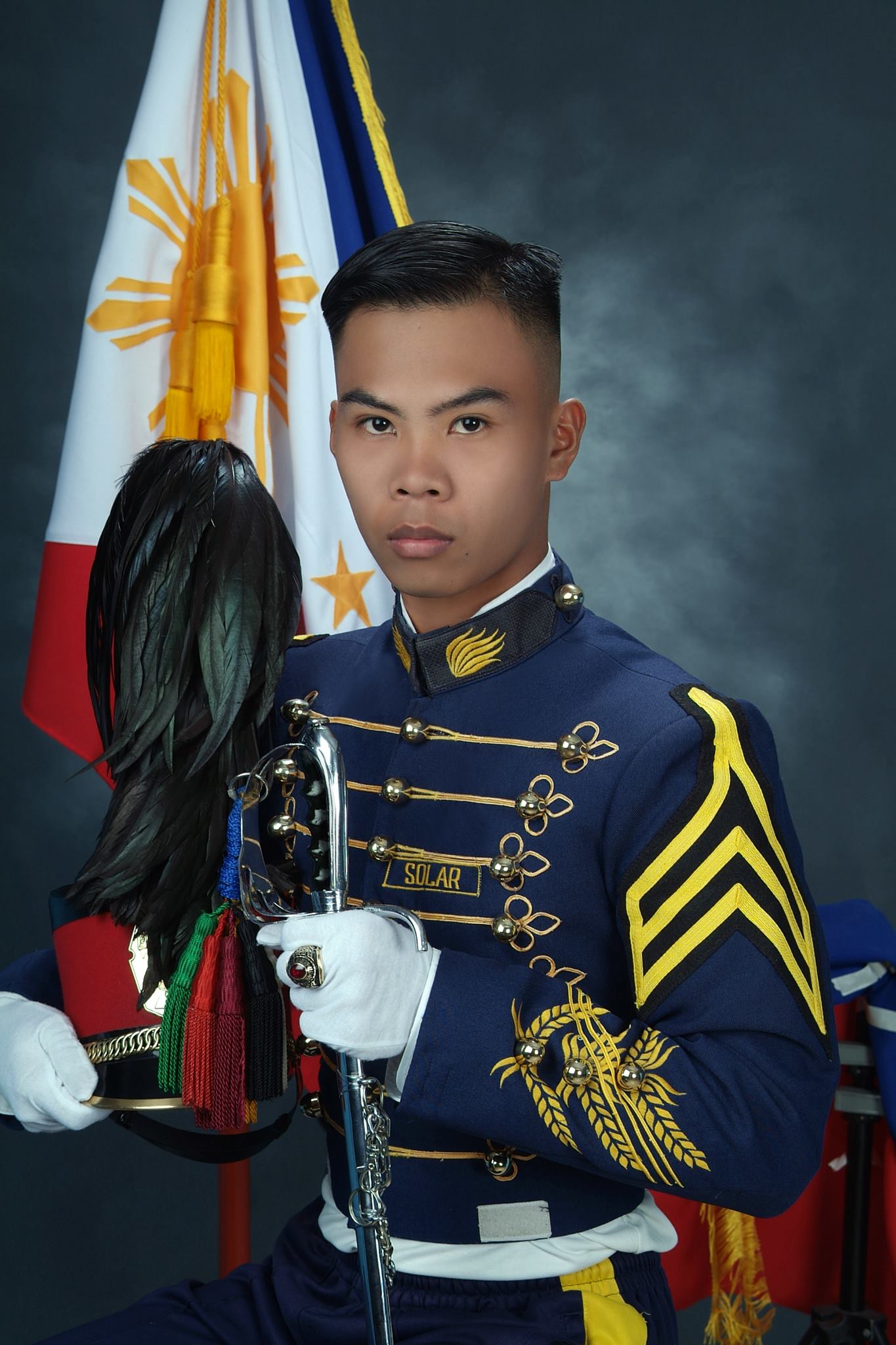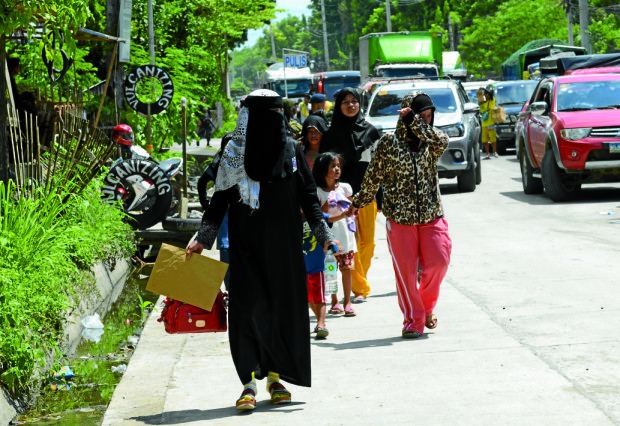From MindaNews (May 24):
COMMENTARY: Addressing challenges posed by the Abu Sayyaf Group (5): Poverty
The issue of poverty is undoubtedly a major contributing factor to unrest in an area. Let us look at the data on the ARMM over a 12-year period.
| Poverty Incidence |
| 2 0 0 3 2 0 1 5 |
| Provinces | % | Rank* | % | Rank** |
| Basilan | 66% | 75 | 37% | 59 |
| Lanao del Sur | 39% | 49 | 72% | 81 |
| Maguindanao | 56% | 72 | 57% | 80 |
| Sulu | 89% | 77 | 55% | 77 |
| Tawi-Tawi | 70% | 76 | 13% | ??? |
* Out of 77 provinces.
** Out of 81 provinces.
Source: Philippine Statistics Authority, Family Income and Expenditure Survey, 2003 data obtained from the Philippine Human Development Report 2005.
|
The Family Income and Expenditure Survey (FIES) for 2003 showed the shocking levels of poverty in the Autonomous Region of Muslim Mindanao (ARMM) in 2003: 89% of the population in the province of Sulu living below the poverty line, 70% in Tawi-Tawi, 66% in Basilan. For the ARMM as a whole, poverty incidence was measured at 64%.
[1]Looking at the statistics since 2003, there appear to have been reductions in poverty levels in the country as a whole and even in the ARMM as a whole. But in 2015 – the latest year that the FIES was undertaken – the ARMM was still the poorest region in the country, with an average poverty incidence for the region of 54%.
[2](As an aside, one wonders how accurate this data is, particularly in troubled regions like the ARMM. Given the level of violence that exists in this area, one can ask whether a sufficiently representative sample of the population in each of the violence-wracked provinces in this region is covered by the survey or whether it is limited to centers of population where normally higher levels of income would be earned. In 2015, for example, Tawi-Tawi was recorded to have an astonishingly low level of poverty, measured by the PSA at 12.7%, an 80% reduction from its level in 2003! Hence, it is very possible that the regional level of poverty is higher than what is reflected in the official statistics.)
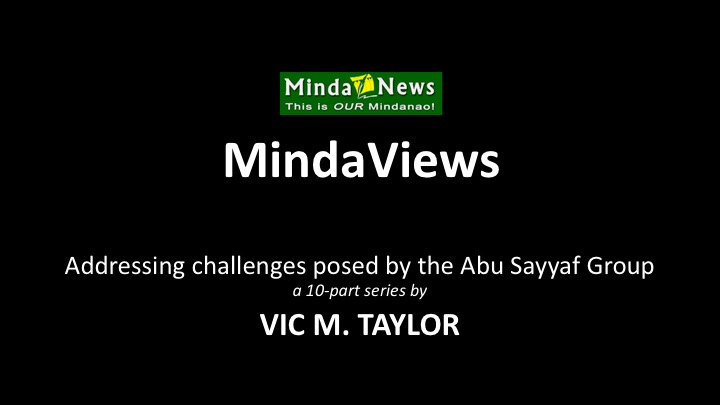
In 2015 the official statistics say that the percentage of people living below the poverty line in Sulu was 55%, significantly down from the 89% recorded in 2003 but still an alarmingly high level. Every other person was unable to meet his or her basic needs. In Basilan the official statistics say poverty incidence was 37%, practically half of the 66% recorded in 2003. However, this implies that every third person was presumably unable to meet the basic requirements for food, shelter, clothing, education, health.
Aside from the unbelievable drop in poverty in Tawi-Tawi in 2015, the other startling revelation in 2015 was Lanao del Sur, the base of the Maute Group, an ISIS-affiliated group allied with the ASG. Poverty incidence practically doubled between 2003 and 2015, from 39% to 72%.
[3]
It is no surprise, therefore, that this poorest region in the country is also the most troubled, beset by strife. There are generations of people in Sulu and Basilan who have known nothing but war, fighting and fleeing, being at the mercy of militants and the pursuing government forces.
It is a vicious cycle, poverty breeding discontentment and militancy, leading to fighting which disrupts the normal patterns of life and the ability of people to scrape out a living, which keeps them in a state of poverty.
Needless to say, the economic condition of a people impacts their health. One proxy indicator of health conditions would be life expectancy. Whereas for the Philippines as a whole average life expectancy in 2009 was 72 years, for the ARMM provinces average life expectancy was:
Tawi-Tawi — 54 years
Sulu — 57 years
Maguindanao — 58 years
Lanao del Sur — 60 years
Basilan — 63 years
[4]
Living in an ARMM province reduces your life expectancy by 10-20 years compared to the norm elsewhere in the country!
Socio-Economic Offensive
Social conditions in the area leave much to be desired. Hence, the initiative taken by the administration of President Duterte to mobilize leading businessmen from Metro Manila to invest in Sulu infrastructure facilities and economic projects is a welcome move.
As noted in the first article in this series, in December of last year the Government launched the
Negosyo para sa Kapayapaan sa Sulu. Under this program, some of the country’s leading business groups pledged to undertake the following projects in Sulu:
- Construction of a 50 MW coal-fired power plant to service the electric needs on the main island of Jolo;
- Rehabilitation and upgrading of the telecommunications facilities in the province;
- Resumption of flights to the main island of Jolo;
- Establishment of an integrated coconut processing plant;
- Provision of medical equipment and training of personnel for hospitals in the province;
- Rebuilding the existing arts and trade school in the town of Jolo;
- Establishment of a supply chain for a feed mill;
- Setting up warehouses and drying facilities for seaweeds as well as training programs for seaweed farmers;
- Setting up a poultry industry and entering into contract growing arrangements;
- Building of houses for low-income families utilizing sweat equity of the beneficiaries;
- Construction of school buildings.[5]
The list of committed projects for Sulu covers the range of
infrastructure (power, telecommunications, transportation),
livelihood (coconuts, seaweeds, poultry, feedmill) and
social services (medical facilities, education, housing), an impressive and balanced list. These are all welcome and badly needed, of course, but the overwhelming desire of the people that the author has met and talked with over the years has been for
kabuhianan, the means to sustain one’s life or livelihood.
In promoting livelihood activities, the logical starting place would be the existing resources of the area and the traditional livelihood undertakings of the people in the area, but looking at how productivity could be increased, quality improved as well as backward and forward linkages. Thus the inclusion of an integrated coconut processing plant as well as storage and drying facilities for seaweeds and training for seaweed farmers are good moves. One would hope that investors could be found to help the coffee, fruit and fisheries industries, all traditional areas that Suluanos are engaged in.
The inclusion of a poultry project is interesting. In fact, groundbreaking has already taken place on the site in Patikul. There had been efforts in the past to set up commercial poultries in the province but these all somehow failed, people say due to disease, likely due to the lack of proper management and technical processes. Hopefully this time, with the close supervision of the investor/proponent, Bounty Fresh, this project will succeed and will lead to replication elsewhere in the province.
With regard to coconuts, aside from the integrated processing plant, perhaps one could encourage farmers to do inter-cropping – coffee, cacao, bananas, pineapples, chili peppers, etc. – to produce supplementary income streams.
With regard to fisheries – which has not been included in the list of committed projects – perhaps the construction of a cold storage facility could be considered so that fishermen are not at the mercy of traders and market vendors because they have to sell off their catch immediately. In fact, DA Secretary Manny Piñol has talked precisely about setting up one or more cold storage facilities in the region which could also serve as a regional food terminal.
For these production activities to flourish, some “support” interventions are needed:
- Reliable power supply. This would be essential for some of the facilities such as the oil mills, fruit processing plants, cold storage plants, etc.[6] This has been spoken for by San Miguel Corp.
- Assistance in organization of production units, whether in the form of associations, cooperatives or whatever is appropriate. Getting farmers and fishermen to pool their resources and work together on higher-value-added production activities should improve their income levels.
- Assistance in management of production and related activities (e.g., accounting, management of financial resources, logistical arrangements such as central storage and transportation of produce, etc.).
- Assistance in establishing marketing tie-ups.
Aside from the capital investments that will be made, it is suggested that technical assistance arrangements be worked out either from the investor groups or other individuals or organizations who may have the needed experience. This technical assistance should apply not just to the production phases of the projects but, as noted above, even to their organization and management phases. A fair amount of “hand-holding” at least during the initial phases of the various projects will be needed to ensure that these projects are run properly and will succeed. Perhaps tie-ups with Chambers of Commerce outside the province, coursed through the Sulu Chamber of Commerce and Industry, or with industry associations could be worked out.
Marketing tie-ups are essential if people are to earn a fair return on their labor and investments and the ventures are to be sustained over the long term. What is happening now is that while some cooperatives currently exist in these provinces, for the most part farmers and fishermen work on their own and dispose of their products either to traders or vendors in the local retail markets. If tie-ups can be established with large buyers outside the province, and producers are organized into coops or associations, farmers/fishermen can look forward to long-term sale contracts with prices negotiated which would provide them higher margins than they are currently earning.
Historically, the people of the region have engaged in trading activities with neighboring areas to include present-day Malaysia, Indonesia and even Singapore. These trading activities run back for centuries. Historically trade was done on a barter basis, exchanges of goods, and there was an attempt during the martial law period to revive this. It still goes on but on a very limited basis today and while it is still referred to as “barter trade”, it really is no different from standard goods-for-cash trade and only moves one way, no exports from the Philippines, just imports from Sabah to the Philippines.
While there currently are problems with the Abu Sayyaf abducting sailors on the high seas between the Philippines and Malaysia and a fair amount of smuggling of rice, sugar and petroleum products goes on, the matter of trade with the Philippines’ southern neighbors could likewise be re-examined.
There may already be such a mechanism in place which this writer is not aware of, but it would be helpful if there were a central coordinating unit that could keep track of how the
Negosyo projects are going, identifying bottlenecks or problems that may arise, liaisoning between the investor groups and the local Sulu-based partners, identifying support requirements for individual projects, evaluating the impact of individual projects in terms of employment and revenues generated and providing periodic updates on how individual projects and the program as a whole are proceeding.
The launching last December of the
Negosyo program is limited to Sulu. Would it be possible to fashion similar programs for the other ARMM provinces?
TOMORROW: The Shadow Economy
[
Vic M. Taylor, originally from Cebu, has been involved in various peace and development activities in Mindanao, particularly in Basilan-Sulu-Tawi-Tawi (BaSulTa) in the different positions he has held in government and the private sector over the last 50 years.
He started as an instructor at the Notre Dame of Jolo College after his graduation from the Ateneo de Manila University in the late 1960s. Subsequently, he oversaw the Rehabilitation and Development Program for Muslim Mindanao during the early years of martial law under the Office of the President.
Within the last 16 years and upon the request of the families of some kidnap victims, Mr. Taylor assisted these families to help secure the safe release of five victims from the ASG.
Recently, he has been working with a private group that is assisting a community of the Moro National Liberation Front in the Zamboanga peninsula in bringing development projects to their area.
This series is a revised version of a paper written by the author for the Mackenzie Institute, a Canadian security think tank, in light of the execution of two Canadian hostages by the Abu Sayyaf last year]
[1] The author believes that the regional average should in fact have been higher than 64%. Poverty incidence was measured at 39% in Lanao del Sur, an astonishingly low level given one’s knowledge of the area and comparing it with the other provinces in the region.
[2] National Anti-Poverty Commission, “ARMM Still the Poorest Region”,
www.napc.gov.ph/articles/armm-still-poorest-region. There is a slight discrepancy in the data cited by the NAPC. The article cited gives a figure of 53.4%, while the PSA provides an average of 53.7%.
[3] Detailed breakdown for each of the 17 regions and 81 provinces in the Philippines can be found in Philippine Statistics Authority, “Philippine Poverty Statistics”, Table 2. Annual Per Capita Poverty Threshold, Poverty Incidence and Magnitude of Poort Population, by Region and Province – 2006, 2009, 2012 and 2015, which can be accessed at
https://psa.gov.ph/poverty-press-releases/data.
[4] See “Statistical Annex A1: Human Development Index 2009”,
2012/2013 Philippine Human Development Report, (Human Development Network, 2013), hdn.org.ph/wp-content/uploads/2013techstat.pdf.
[5] Alexis Romero, “Business titans vow to support development of Sulu”,
The Philipppine Star, December 21, 2016,
www.philstar.com/headlines/2016/12/21/1655534/business-titans-vow-support-development-sulu; Leila Salaverria, “Top businessmen pledge to invest in Sulu development”,
Inquirer.Net, December 19, 2016, newsinfo.inquirer.net/854921/top-businessmen-pledge-to-invest-in-sulu-development.
[6] See two interesting columns of economist Cielito Habito who wrote about his observations on the priority needs of Sulu as well as how one bankrupt and mismanaged electric cooperative was resurrected: Cielito F. Habito, “Wanted: PPP for Sulu”,
Inquirer.net, February 20, 2012, opinion.inquirer.net/23481/wanted-ppp=for-sulu, and “An impressive turnaround”,
Inquirer.net, November 15, 2011, opinion.inquirer.net/17281/an-impressive-turnaround.
http://www.mindanews.com/mindaviews/2017/05/commentary-addressing-challenges-posed-by-the-abu-sayyaf-group-5-poverty/


